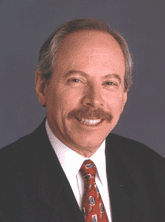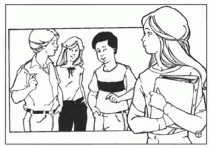By Alan I. Leshner, Ph.D., Director, National Institute of Drug Abuse, National Institutes of Health
(NAPS) - Now that their children have returned to school, right at the top of virtually every parent's concerns is the fear that their children might become innvolved with drugs. And they are right to be concerned. Whether in cities, suburbia or rural communities, whether in wealthy or poor neighborhoods, drugs are now readily available to all young people. And even the seemingly nerdiest kids can speak with apparent fluency and familiarity about marijuana, cocaine, heroin, and such strange-sounding things as blunts, ecstasy, roofies, Special K, and crystal meth. Drugs are an equal opportunity destroyer. Fifty percent of young people have used an illegal drug by the time they leave high school. What's a parent to do? How can you predict if your children are going to use drugs? What can you do to prevent it? How can you help them once they've started using?
 Dr. Alan I. Leshner
Dr. Alan I. LeshnerNIDA Director
The first step is to understand why Sally or Johnny might be using drugs. Researchers have identified over 50 factors that might put someone at risk for drug use. These risk factors can be found at the individual, the family, peer groups, and broader community levels. They include things like having too much free time, weak family structures, peer group, social pressures, and the glorification of drug use by some in the popular media. But those risk factors really only talk about overall probabilities of whether young people with certain characteristics might be more or less prone to using drugs. Knowing about these risk factors can help keep a parent alert, but no set of risk factors determines that a particular child will use drugs, and many kids who have many of those risk ractors don't even try drugs. So parents really have to deal with the individual child's situation and state of mind.
Two Paths to Drug Use
Research on the pathways to drug use and addiction suggests the immediate decision to use drugs is driven, basically, by one of two types of reasons. One group of young people seems to use drugs simply to feel good. They are seeking novelty or excitement, to have a good time. I include in this group those who say they use drugs just because all their friends are doing it; they just want to join in common fun or to be "cool." These kids are the ones most likely to be responsive to prevention programming that educates about the harmful effects of drugs on their bodies, and are most influenced by the powerful protective factor of having strong and loving parents interested and involved in all aspects of their lives. These kids also seem to have the best chances of being successfully taught to seek alternative ways of having fun and to resist the temptation to seek novelty in drugs and other harmful ways.
But there is also a second, very different group of young people who are using drugs for quite different, actually more intractable reasons. These are kids who in some way or another are suffering and use drugs to try to make themselves feel better, or even normal. This group often includes people stuck in very difficult life situations - poverty or abusive families, for example. It also includes kids suffering from a variety of untreated mental disorders, like clinical depression, manic depressive illness, panic disorders, schizophrenia. Estimates are that as many as 10 million children and adolescents may suffer from emotional and psychiatric problems of such magnitude that their ability to function is compromised, and the majority of those kids are at extremely high risk of becoming addicted to drugs.
These young people are not using drugs just to feel good. These children are actually trying to medicate themselves with drugs. they use drugs becase they think they will make them feel better, or normal, in the same way that other people might be given anti-depressants or anti-anxiety medications. The problem, of course, is that using illicit drugs is not an effective treatment. In addition to other, perhaps more obvious problems - like that their use interferes with normal functioning - this kind of drug use actually will ultimately make them feel worse, not better. Medical research has shown clearly that this kind of drug use only exacerbates underlying psychological problems.
Treatment Different For "Self Medicators"
Both the preventive and the treatment approaches for these "self-medicating" young people need to be quite different from the approaches one would use with novelty seekers or social users. For example, it can't be very meaningful to warn people who feel terrible today that using drugs may alter their brains a month from now. Their problem is getting through today. And encouragement to seek alternative sources of fun or to seek nicer friends doesn't seem very meaningful for them either. Again, they are trying to get through today's issues.
Even the otherwise powerful protective factor of loving, supportive family involvement in the life of the child is not very effective in these areas. Those young peopie who are trying to self-medicate must have help with their underlying problems. They need professional treatment.
Whatever the reasons, how do you know if your children are using drugs and what do you do if they are? Telltale signs include recent mood and energy level changes, changes in eating habits, specific signs like redness around the eyes, and changes in social and educational performance. Listen carefully to what your children are telling you about their lives and how they feel. And watch how they behave It may seem natural for an adolescent to be a bit surly, but most adolescents are not actually sullen, withdrawn, apathetic and lethargic. You should talk to your child about any of these symptoms. You do need to know.
What Can Parents Do?
What, if the answer is "yes," your child is using drugs? What do you do? In a small percentage of cases, parents can work with their own kids to get them to stop using drugs. This might be easiest when the young person is just using drugs occasionally to have a good time. And, of course, the earlier you start talking to your children about drugs, the better the chances are they won't become involved with them. If a child reaches the age of 20 without using alcohol, tobacco or marijuana, the probability is almost zero he or she will ever develop a serious drug problem.
But if you suspect your child is really trying to self-medicate, or if you suspect your child is using regularly or even is addicted, you need to get help right away from the professionals. These are not, problems the typical parents can handle alone. And help is available. There are many professional social workers, nurses, drug counselors, psychologists and psychiatrists well trained to deal with both mental disorders and drug use problems. Your child's school, your family doctor, or community health center can help get you a referral. Do not assume Sally or Johnny's drug use is just a passing phase or something every kid must go through. It isn't. It may well be the beginning of a lifetime of problems that could be prevented with early intervention.

